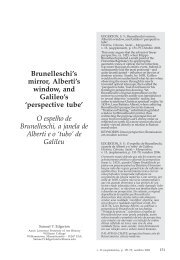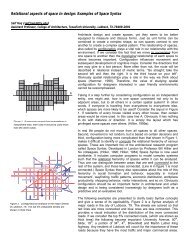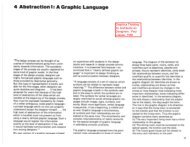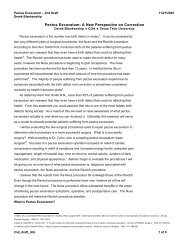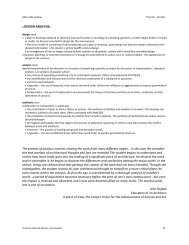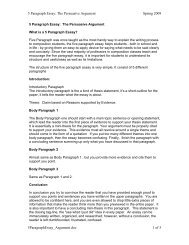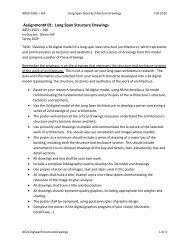The Eyes of the Skin
The Eyes of the Skin
The Eyes of the Skin
You also want an ePaper? Increase the reach of your titles
YUMPU automatically turns print PDFs into web optimized ePapers that Google loves.
PART 1'<strong>The</strong> hands want to see, <strong>the</strong> !!yeswant to caress.'JohannWolfgang von Goe<strong>the</strong>l<strong>The</strong> dancer has his ear in his toes.'Friedrich Nietzsche2'If <strong>the</strong> body had been easier to understand, nobody would havethought that we had a mind.'RichardRorty3<strong>The</strong> taste if <strong>the</strong> apple ... lies in <strong>the</strong> contact if <strong>the</strong>.fruit with <strong>the</strong>palate, not in <strong>the</strong>.fruit itself; in a similar way ... poetry lies in <strong>the</strong> meetingif poem and reader,not in <strong>the</strong> lines if symbols printed on <strong>the</strong>pagesif a book. What is essential is <strong>the</strong> aes<strong>the</strong>tic act, <strong>the</strong> thrill, <strong>the</strong> almostphysical emotion that comes with each reading.'Jorge Luis Borges4'How would <strong>the</strong> painter or poet express anything o<strong>the</strong>r than hisencounter with <strong>the</strong> world?'Maurice Merleau-Ponty"Vision and KnowledgeIn Western culture, sight has historically been regardedas <strong>the</strong> noblest <strong>of</strong><strong>the</strong> senses, and thinking itself thought <strong>of</strong> in terms <strong>of</strong> seeing. Already inclassical Greek thought, certainty was based on vision and visibility. '<strong>The</strong>eyes are more exact witnesses than <strong>the</strong> ears,' wrote Heraclitus in one <strong>of</strong>his fragments.6 Plato regarded vision as humanity'sgreatest gift,7 and heinsisted that ethical universals must be accessible to '<strong>the</strong> mind's eye'. 8Aristotle, likewise, considered sight as <strong>the</strong> most noble <strong>of</strong> <strong>the</strong> senses'because it approximates<strong>the</strong> intellect most closely by virtue <strong>of</strong> <strong>the</strong> relativeimmateriality<strong>of</strong> its knowing'.9Since <strong>the</strong> Greeks, philosophicalwith ocular metaphorswritings <strong>of</strong> all times have aboundedto <strong>the</strong> point that knowledge has become analogouswith clear vision and light is regarded as <strong>the</strong> metaphor for truth.Aquinas even applies <strong>the</strong> notion <strong>of</strong> sight to o<strong>the</strong>r sensory realms as wellas to intellectual cognition.<strong>The</strong> impact <strong>of</strong> <strong>the</strong> sense <strong>of</strong> vision on philosophy is well summed up byPeter Sloterdijk: '<strong>The</strong> eyes are <strong>the</strong> organic prototype <strong>of</strong> philosophy. <strong>The</strong>irenigma is that <strong>the</strong>y not only can see but are also able to see <strong>the</strong>mselvesseeing. This gives <strong>the</strong>m a prominenceamong <strong>the</strong> body's cognitive organs.A good part <strong>of</strong> philosophical thinking is actually only eye reflex, eyedialectic, seeing-oneself-see.' 10 During <strong>the</strong> Renaissance, <strong>the</strong> five senseswere understood to form a hierarchical system from <strong>the</strong> highest sense <strong>of</strong>14THE EYES OFTHE SKINPART I IS



